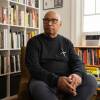As the University of Massachusetts Medical School in Worcester initiated its closure last week — moving all courses online, closing libraries and gyms and requiring take-out at cafes, all to help slow the spread of coronavirus — Chancellor Michael Collins made clear that it was no drill.
“This is the real thing,” Collins told WGBH News on Wednesday, isolated in his office on campus.
After pouring over research coming out of Italy and China, Collins said, UMass faculty are developing new courses that focus on COVID-19 for their third-year students.
"We're actually going to be giving them a COVID-slash-epidemic series of lectures for a week after they come back, because they're in clinical rotations right now," Collins said. He spoke the day before the Association of American Medical Colleges abruptly suspended those clinical rotations for all students across the country, giving hospitals more time to develop contingency plans for the best way young doctors and nurses can contribute to the fight against the pandemic.
Local hospitals, community health centers and medical schools, including those at Tufts, Harvard and Boston University, are scrambling to prepare for what many predict will be a dramatic spike in COVID-19 cases — a surge that could overwhelm the state's health care system.
“I believe this is our country’s Dunkirk moment,” Tufts President Tony Monaco said Thursday, referring to the 1940 World War II evacuation of Allied troops from a French seaport.
As hospitals brace for a surge in patients, Monaco has called on colleges with surplus dorm rooms and medical resources to engage with local government and emergency officials to make campus buildings available if needed.
“We need local efforts to help our local hospitals manage the number of patients and the spread through the community,” Monaco said. “Some of that, right now, is stockpiling and grabbing all swabs and other supplies from our research labs and getting them over there.”
In a move to supplement personnel, the state's medical board voted unanimously last week to loosen rules for online medicine and physician credentialing, accelerating licensing of medical school grads.
“We’re going to need every person that we can have,” said Dr. Glennon O’Grady, medical director at the South End Community Health Center in Boston, where physicians are struggling to take care of patients by phone because they don’t have enough protective equipment.
O’Grady has long called for changes to how the state and insurance companies vet medical professionals. He recalls one medical school graduate who finished her residency but the health center couldn’t get paid for her work until insurers credentialed her.
“She was a board-certified family physician, licensed in Massachusetts, but had to go work at Kohl's in order to pay for her rent,” said O’Grady, who welcomes the medical board’s more flexible rules.
In this crisis, so does Collins.
"That would bring thousands and thousands of workers into the workforce if we need them between now and the day they'd start, which is typically mid-June," he said, referring to medical students in their final year.
In May, UMass Medical is set to graduate more than 200 physicians just as they may be needed as reinforcements. Combined, Boston University, Tufts and Harvard will produce about 500. Harvard has told third- and fourth-year medical students that they may be called in to help with patients who are not exposed to COVID-19. UMass Boston said more than 350 nurses will finish their degrees online this spring.
That may not be soon enough, warned former homeland security officer and WGBH News contributor Juliette Kayyem.
"It's not just going to be a surge of patients, but a surge in a way to be able to protect them and care for them,” Kayyem said. “Respirators, ventilators, people, beds, tents, facilities that can house [patients]."
Kayyem said colleges, medical schools and the state should step in to ease the anticipated burden on hospitals.
"Workforce protection is key now,” Kayyem said. “Possibly changing rules about certification, getting people who have retired to come in, med students — all of that is necessary.”
Eight colleges in the state train respiratory therapists, who operate the ventilators that can save the lives of seriously ill COVID-19 patients, according to universities.com. In 2015, they graduated about 175 therapists, not including Northeastern University, the biggest of the colleges.
At Harvard and other local colleges, scientists are ramping down their research labs, suspending their work for safety reasons and donating protective gear to health care workers.
At UMass Memorial Medical Center in Worcester, dozens of fourth-year students were pulled from their clinical rotations last week to slow transmission of COVID-19 and to protect their health.
“I am pretty disappointed,” said Patrick Lowe, a 30-year-old from Northborough, Mass., who is in his final year of study and is trained to work in emergency rooms.
“This has been a pretty unique learning environment that I hope we won't see ever again, but it's been a great opportunity to learn how medicine works in a crisis," said Lowe, who is set to graduate in May.
For now, though, he’s quarantined in his home in Worcester and said, wherever he starts as a doctor, he’s eager to get back to work on the front-lines.





